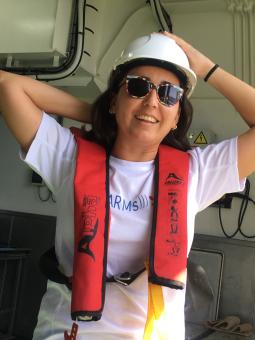Oceanography is a science that is highly dependent on observations and measurements to give us a better understanding of our seas in a changing climate.
Our Ocean Technology and Engineering (OTE) group are at the forefront of innovation in designing, creating, and using novel sensors and instruments to collect these vital data, and continue to push boundaries. For this month’s scientist spotlight, we spoke to Sensor Science Delivery Lead Dr Patricia Lopez-Garcia about her role in this pioneering technology development.
What is your role in research at NOC?
As a Sensor Science Delivery Lead my main task is to coordinate the scientific, technical, and engineering aspects of projects within the OTE group at NOC, where we work mainly on projects developing and deploying novel sensor technologies. I work with the principal investigators and co-investigators who conceived and are responsible for the projects, and the technical teams who do most of the work needed to finish the project.
I also talk to people from companies and funding bodies and set up meetings to try and make our work as useful as possible. As well as helping to deliver projects, I am also involved in some of the research work as I have a background in analytical chemistry. I work in the analytical team where we provide scientific input to the development of sensors and technology and we help to improve the chemical methods involved.
What drew you to working in this area?
My research started when I was in the second year of my degree in marine sciences. I joined a faculty workshop and heard for the first time about the African dust outbreaks and how they were possibly benefitting the waters around the Canary Islands by bringing nutrients and other components.
Hearing that those dust plumes could reach the Caribbean had a big impact on me, maybe because I had just moved from Cuba to Gran Canaria and I was dreaming of flying to my home town most nights. The very next day I went to talk to the head scientist and officially started my career as a ‘lab rat’ in a white lab coat (and occasionally wearing a safety helmet and boots on a research ship at sea).
I have been working in different projects and places, always related with the sea, ranging from the impact of African dust in oligotrophic waters, to water quality management, and to sensors for oceanography. In most cases I have worked in both technical and management aspects of the project. Each of these experiences has added a new piece to the scientist I am today.
What science are you currently working on?
One of the projects I am most involved in at the moment is TechOceanS. Not only am I a Delivery Lead for the project but I am also involved in the work to develop a sensor to detect contaminants in the marine environment. Recently, I have been involved in organising the final technology trials that will be carried out in Gran Canaria in spring 2024. At least 7 new technologies developed in this project will be combined and integrated in 4 different autonomous vehicles including the Autosub Long Range (ALR) aka Boaty McBoatface.
I am interested in improving the measurements from sensors, and I recently had a great opportunity to work side-by-side with experts all around the world as co-lead of the OceanGliders Oxygen Standard Operational Procedure (SOP). This international collective effort is ensuring that the valuable data acquired by gliders in Europe and around the globe will be inter-comparable and of use to a broader community in order to better understand our oceans. This SOP is already creating impact in the glider community and we have more than 25 authors globally represented and glider teams are already following this SOP during their activities.
What is your favourite thing about the work you do?
That I never (or almost never) get bored! There is always something to do, to learn, someone new to meet… it’s always a challenge! It also helps that everybody you meet in your work is someone that loves what they do.
I love collaborating with researchers from all around the world and learning from them. I am always amazed how much you can learn every day. I think it is important that we are always open to all knowledge; a university degree doesn’t always give you the answers you need.
What impact does your science have on society?
To address oceanographic community requirements for autonomous observations, new types of technology must be developed. New in-situ sensors and samplers are needed to measure new parameters, reduce instrument size and power consumption, increase measurement traceability, improve stability, reduce mechanical engineering requirements and improve communication and automatic data transfer to data centres.
Our group fills the existing gaps by delivering sensors and samplers capable of remotely measuring essential ocean variables (EOVs) as well as regulatory targets such as the Marine Strategy Framework Directive (MSFD) and OSPAR. MSFD is European legislation which aims to protect the marine environment, while OSPAR is the mechanism by which 15 Governments & the EU cooperate to protect the marine environment of the North East Atlantic.
More from Dr Patricia Lopez-Garcia
Glider experts share knowledge to improve global ocean health data (National Oceanography Centre)
Join the NOC Ocean Alliance
If you or your organisation would like to find out more about supporting our endeavours, contact us at giving@noc.ac.uk A gift allows you to have a direct impact on world leading ocean research and innovation, and helps ensure NOC continues to make global impact from the coast to the deepest ocean. Whatever your passion – combating climate change, conserving and protecting ocean life, or equipping the next generation of marine scientists, you can donate here.

